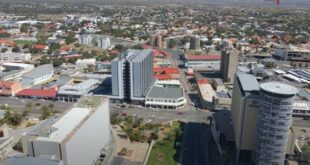Following a series of politically-motivated murders in Cameroon in the past week, the Society for Threatened Peoples (Gesellschaft für bedrohte Völker, GfbV) has warned against an escalation of violence and a possible civil war in the country.
“The dispute over the discrimination of the English-speaking minority in the central African state must be urgently resolved through political negotiations in order to prevent a further escalation of tensions,” the GfbV director Ulrich Delius said in a press statement on Monday. “However, President Paul Biya, who has ruled for 35 years, does not seem to be ready for a credible dialogue with the agitators,” the Gottingen-based international human rights organization noted.
GfbV called for the punishment of persons responsible for the escalation of violence to build trust for a credible political dialogue among all sides of the conflict. The group specifically called for respected representatives of the English-speaking minority and the French-speaking majority to come together to deliberate on the way forward for the country.

Within one week, four members of Cameroon’s security forces were killed in three separate bomb attacks believed to have been carried out by separatist forces in the English-speaking North West and South West regions. The attack on security forces is a violent turn to the protests which have largely been heavily clamped down upon by the government. Separatists are pushing for an independent republic under the name Ambazonia.
The conflict over the future of the Anglophone Cameroon escalated at the end of last year, as security forces brutally put down protests in the regions. The conflict worsened on 1 October 2017 when soldiers killed at least 17 protesters during the symbolic proclamation of the “Republic Ambazonia” by the
English-speaking minority secessionists. Reports, quoting eyewitnesses, say soldiers in helicopters fired indiscriminately on the celebrating crowd in Bamenda. Later, a state of emergency was imposed on the city and the mobile communications cut. Several dozen protesters were also arrested and about 20,000 Anglophones fled the violence to Nigeria.
The English-speaking minority regions of the country constitute around one fifth of the country’s 23 million citizens. For many decades, Anglophones have complained of being inappropriately treated as second-class citizens in society, politics and business.
Anglophones also accuse the Francophone-dominated central government of neglecting their regions.

President Paul Biya is on record to have stated that the unity of the central African nation remained non-negotiable. He has condemned the violence and called for dialogue – which process has yet to be initiated.
The United States, the United Kingdom, the United Nations, European Union, African Union and other parties have all backed the call for dialogue and the need for the respect of the rights of protesters.
The conflict in Cameroon dates back to the colonial era when the former German colony was split between France and the UK in 1916.
After a referendum, inhabitants of the English-occupied areas chose to join the larger French-ruled region to form the independent state of Cameroon 1 October 1961.
Adira Kallo
 THE AFRICAN COURIER. Reporting Africa and its Diaspora! The African Courier is an international magazine published in Germany to report on Africa and the Diaspora African experience. The first issue of the bimonthly magazine appeared on the newsstands on 15 February 1998. The African Courier is a communication forum for European-African political, economic and cultural exchanges, and a voice for Africa in Europe.
THE AFRICAN COURIER. Reporting Africa and its Diaspora! The African Courier is an international magazine published in Germany to report on Africa and the Diaspora African experience. The first issue of the bimonthly magazine appeared on the newsstands on 15 February 1998. The African Courier is a communication forum for European-African political, economic and cultural exchanges, and a voice for Africa in Europe.
































